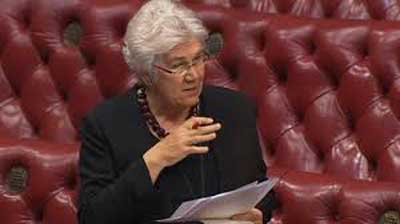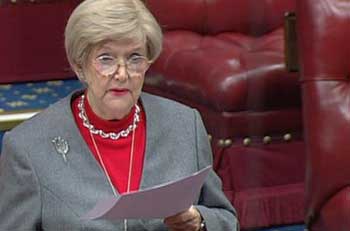
The House of Lords had another short debate on leasehold issues last Thursday and urged the case for reform to benefit five million leaseholders.
The debate was initiated by by LibDem peer Baroness Maddock, who said “further reform is still needed and is very much a live concern for the millions of people living in leasehold properties”.
“The majority of new homes being built are flats, bringing the whole matter of leasehold further to the fore. The current system vests too much power in the hands of freeholders.
“As a Liberal, I always want to devolve power to as many people as possible, so I want to see leaseholders having a proper say in the management of their homes.”
Baroness Maddock said that right to manage was a “a little known provision, and backed the think-tank CentreForum’s leasehold report which urged that information about right to manage be included in service charge demands”.
There was also backing for a renewed look at commonhold tenure, and the Leasehold Knowledge Partnership, with Sir Peter Bottomley, is hosting a Westminster round-table on the subject on June 26.
“CentreForum has proposed that in order to build a critical mass of commonhold properties, and to establish the system as part of the norm, all new blocks of flats built after 2020 should be sold as commonhold,” said Baroness Maddock.
Baroness Maddock was concerned about leaseholders being charged for improvements to their properties, which benefit freeholders twice. Once when they demand an initial charge, and again “because, invariably, the improvements increase the value of the property”.
“When the lease is then renegotiated or sold at a higher value, the freeholder benefits. CentreForum has proposed that the right to charge for permission to make improvements should only be available when the freeholder can prove that the charge requested would reduce the value of the property.”
 Baroness Gardner of Parkes (left) chose to refer to the LKP figures on leaseholders, referring to five million leaseholders, not the three million leasehold properties the government adopts.
Baroness Gardner of Parkes (left) chose to refer to the LKP figures on leaseholders, referring to five million leaseholders, not the three million leasehold properties the government adopts.
“Even in political terms, people should be aware that 5 million votes are worth having. It is important.
She added that the “problem with leasehold [is that] people really do not understand it until they are already caught up in it, particularly if they are caught up in it in the wrong way, because they did not look at the lease before signing it or they were so thrilled with what they found that they put aside any worries about the future.”
Baroness Gardner described her own frustrations with a leasehold flat, which she bought for “the day when I could not manage stairs”.
“At the time, all those years ago, we had a residential porter who took any parcels, let people in and did all sorts of useful things.
“What happened? The head lessee became a person who was interested only in making a profit out of it.
“They decided that the flat which the caretaker was living in was too expensive for that money to be wasted like that, so they fired the caretaker and now have someone who comes in for two or three hours a day and the money from that is now in the head lessee’s pocket.
“There has been too much of this profiteering at the expense of residents in these blocks.”
“Transparency is perhaps the biggest problem for everyone. People do not know what they are being charged for and whether or not it is legitimately required.”
She paid tribute to the work of Sir Peter Bottomley in the sector.
“There have been too many occasions—cases on the record—where people have found that they are making payments for things such as service charges but half of that money goes into the pocket of the head lessee or freeholder, who has made a deal with or even owned the builders or insurance company used.
“It is all quite wrong that that sort of thing should be happening and that leaseholders do not get honest answers when they ask about it.”
Baroness Gardner expressed her enthusiasm for commonhold as an alternative form of tenure, and lamented the state of the property tribunals.
“Something has gone very wrong with leasehold valuation tribunals since the basic £500 maximum that you were asked to pay has been changed to a £500 minimum to bring your case at all, and with possibly very heavy costs after that.
“We also have the practice, which I have mentioned in the House before, whereby, win or lose, the head lessee or freeholder charges his costs in the tribunal back to the leaseholders. That was never the intention.
“The intention was that a leaseholder would not normally have to meet any costs and this would be a basis on which everyone could present their own cases. There is now a new tribunal system, as from last October, and I think we will be hearing a lot of dissatisfaction about this very shortly.”
 Responding for the government, Baroness Stowell of Beeston (right) made an issue of the amount of leasehold properties in England and Wales.
Responding for the government, Baroness Stowell of Beeston (right) made an issue of the amount of leasehold properties in England and Wales.
“… Lady Gardner estimated that there were about 5 million leasehold properties in England. The Government estimate 3 million, but that certainly makes up a significant proportion of the housing market.”
She added that she was an owner-occupier of a leasehold flat and understood “that it can be a complex and technical legal system”.
“But not everyone who owns a leasehold property experiences a lot of problems. What is important is that we strike the right balance in a way that recognises and protects the rights and interests of both leaseholders and freeholders and that we make sure that these rights are kept up to date with changing realities without making things more complicated, burdensome or expensive.”
Baroness Stowell said that she would be asking developers why commonhold is not pursuing commonhold as an option.
“The key point that I want to make in conclusion is that, while we do not have plans to reform the legislation in this area, my honourable friend the Housing Minister is very interested in the concerns that are being raised.”
Lord Best, the former chairman of the Hanover housing association, will be chairing an all-party meeting on leasehold issues.
Full debate can be read here



























I thank all those who are taking an interest in the abuses inflicted on leaseholders.
Of course it is said that many do not understand the consequences of leasehold. That is true.
However, since so many are forced to buy a leasehold property if they want to get on the property ladder, or want to downsize into a flat, in a sense knowledge of leasehold is of little use.
That leaehold only benefits those with vested interests ie the freeholders is becoming clearer by the day. Leasehold is coming to an end and a fairer system will come in (though it will take time)
The challenge is for the first major builder to offer a new development for sale on a commonhol;d basis. I say to the major builders “Change is coming” Work with it!
And the major builder says” But it produces £40K in ground rent worth £600K + together with retained staff accommodation/rent, a common parts lease, management rights and income on commissions fees and consents…hmm…. that is a nearly £1M. Why on earth would I give that away?”
The problem with common hold is that no UK mortgage lender will accept it. So any developer would be insane to sell their units as common hold as they won’t be mortgageable and essentially will be worthless. An approach to the Council Of Mortgage Lenders is needed to ensure common hold title is a tenure that can be mortgaged otherwise everybody is simply wasting their time.
A substantial proportion of London leasehold properties are sold to cash buyers, often from overseas. However, it would be interesting to know what objections, if any, mortgage lenders have to commonhold. Maybe this is something LKP could inquire into?
Ian that is incorrect- the CML handlook was amended a long time ago to include commonhold and major lenders will lend on it, though many staff will scratch their heads at first, and any leaflets have to be dusted off, if they can even be found.
Provided the asset value backs the mortgage, i cannot see any problem with granting a mortgage on a commonhold property.
That said, what would be a problem as AM alludes to is the banks lending to developers to build the properties, especially if the loans are secured against future incomes freeholders can derive from owning the freehold.
Or, at its simplest level, a developer is, on the example above of 100 flats, giving away £1M which they could sell to a freeholder, and that is a huge chunk of money that could pay off a lot of borrowing interest early on, as many of the FH sales are presales to avoid right to first refusal. As you indicate the bank sees an early return and reassures them as to viability.
You can get around this problem by not wandering into the bear trap of commonhold and require by law that new builds must have a resident owned party to the lease manager, the RMC in a tripartite lease, and leave the developer free to sell it to a freeholder whose only involvement is their ground rents. It even make sense to require instead a head lease to the RMC of Perpetuity – 1 day granting under leases to each flat of P – 1 year, so that any issues of forfeiture and rent collection , as well as the running of the block is with the residents.
Following the article in the Daily Mail today I would point out that the residents of our blocks of flats joined together to get rid of the managing agents who were simply letting the buildings go to rot.Things have improved with the new agents but as they were left no balance on takeover have struggled ever since.One issue I have with the system is that I paid £13000 to extend the lease approx 2yrs ago and I have never been able to find out how this figure was arrived at. I tried quizzing LEASE without luck, tried my MP only to be given a batch of papers which did not give me answer I was looking for. I tried several surveyors provided by LEASE who did not have the courtesy to get back to me.. I have come to the conclusion that to protect yourself you have to pay up whatever the freeholder asks for.A serious shake up of this archaic system is urgently needed.
I have recently requested a quotation from the Management Company which acts on behalf of the Freeholder for the likely cost of buying the freehold on my detached property.
They quote an initial fee for the work to provide a quote and only if I accept the offer will it then be deducted from the fee quoted.
Is this normal and also is their any rules or regulations governing such charges, based on say house value, the years rental already paid and the length of time remaining on the 99 years lease.
If your property is a detached house your enfranchisement should come under the Leasehold Reform Act 1967 that is not time limit barred – except for the statutory
2 months from your application date & agreement for the freeholder / revisioner during which other parties can file objections to your freehold purchase application..
The only drawback is that the legal profession & Judiciary in the Tribunals & Court of Appeal ignore the Statutory Provisions that apply in this and many other Acts of Parliament that you must due your own due diligence on every problem that arises or otherwise they not you complicate the issues to such a degree that Justice is perverted in many cases and it is a toss up if the Laws are applied correctly as so frequently they are not…. the word is CAUTION if you have to approach the 1st Tier Chamber who are linked to the Upper chamber by their Executirve Advisor’s who are chairman selected from local law firms often with covert cui bono interests & financial agendas that have nothing to do with the Rule of Law or Justice. .
First of all it should be understood that as purchaser of the freehold you will be responsible for all the current freeholders costs. If you deem those costs not to be reasonable you can challenge at the Upper Tribunal.
It is vital you engage skillede surveyors who are experienced in freehold purchase.
Normally your surveyor would come up with a valuation for the purchase. The freeholder will do their own valuation, which as you would expect will be higher than your own valuation.
In many cases after negotiations have taken place an amount is agreed and you buy the freehold..
Where negotiations fail, you trot off to the Upper Tribunal There is a very complicated formula that can be used to calculate the true value.
I would caution against trying to get a really low valuation in the hope of saving money. Anything that can be shown as unreasonable could backfire on you.